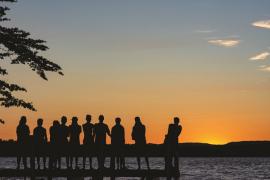“I see how hard you’re working.”
That was all it took. One counselor described this simple recognition as the highlight of their entire week. In the swirl of noise, energy, and long camp days, what stood out wasn’t a grand gesture; it was a micro-moment of care.
This summer, we collected extensive staff feedback at Camp NAC in Newtown, Pennsylvania. What emerged was a powerful reminder: staff wellness isn’t built on perks or pizza parties. It’s built on systems that create safety, support, connection, and belonging. And when staff feel they belong, they don’t just survive, they grow into leaders.
Why Staff Wellness Is Leadership
We often talk about the importance of staff training, skill-building, and retention. Yet the deeper truth is this: staff wellness is leadership development.
Research on counselor retention shows that a strong sense of well-being and belonging directly influences whether staff return and how effectively they lead campers (Whitacre & Farmer, 2013). A burned-out counselor can’t lead campers. A disconnected staff member can’t create belonging.
Wellness itself is more than self-care; it’s a system. It shows up in the ways we back staff during camper behavior challenges, in the rituals that create community, and in the recognition we choose to give (or withhold). These systems don’t just ease stress; they actively build leadership skills such as communication, conflict management, and empathy. This aligns with the American Camp Association’s MESH framework, which highlights how consistent support and visible leadership foster personal development in both campers and staff (Hamilton & Gaslin, 2022).
At Camp NAC, we used this framework as a lens for analyzing staff experiences. Our findings show how belonging and recognition can directly influence leadership capacity.
Case Study: Camp NAC Staff Wellness Survey, Summer 2025
Following the summer season, staff members completed an anonymous survey on their experiences. The results highlighted both strengths and challenges:
- Most staff highlighted that they felt well supported by peers and managers, making support one of the strongest wellness pillars in the survey.
- An impressive 87 percent reported growth in core leadership competencies such as patience, communication, problem-solving, and resilience.
- Seventy-two percent cited bonding events (spirit days, staff socials, traditions) as the most meaningful part of their summer.
- Recognition and belonging were the most frequently named drivers of staff well-being.
- The most common growth opportunity identified was strengthening leadership presence during camper behavior challenges.
This data suggests that when camps intentionally design for belonging, they also cultivate the next generation of camp leaders.
These results reinforce what research has long suggested: belonging is a fundamental human need (Maslow, 1943; Walton & Cohen, 2011). When camps create systems of recognition and community, staff thrive. When those systems break down, stress increases and leadership capacity declines.
Four Key Insights
The following key insights highlight counselor wellness tactics that help staff flourish.
1. Counselor Wellness Is a System, Not a Perk
Wellness can’t be reduced to occasional snacks in the breakroom. Counselors told us that what sustained them was consistent systems of support. Daily check-ins, moments of recognition, and predictable feedback loops created stability.
One counselor explained, “It wasn’t the one-off appreciation days. It was knowing someone would check in with me every week and actually listen.”
Practical Steps:
- Build structured recognition systems (daily shoutouts, rotating appreciation notes).
- Incorporate wellness check-ins into staff meetings.
- Normalize “safe to fail” environments where mistakes are treated as learning opportunities.
2. Behavioral Challenges = Staff Wellness Challenges
Our staff weren’t worn down by long hours alone. What truly drained them was feeling alone in camper behavior incidents.
Several staff noted the stress of being left without leadership support in moments of escalation. One counselor wrote, “I can handle a lot, but I can’t handle feeling like I’m the only one responsible when things get unsafe.”
This echoes the American Camp Association’s Mental, Emotional, and Social Health (MESH) framework, which emphasizes consistent systems and visible leadership during camper challenges (Hamilton & Gaslin, 2022).
When supervisors step in with guidance and modeling, these high-stress situations become powerful leadership development opportunities for counselors, teaching them how to navigate conflict, regulate emotions, and support others under pressure.
Practical Steps:
- Train leadership to visibly show up during behavioral incidents.
- Create clear, enforced behavior protocols that staff can trust.
- Debrief challenging moments with counselors to validate their efforts and restore confidence.
3. Micro-moments of Care Go a Long Way
When staff were asked what motivated them, they didn’t point to paychecks or big events. They pointed to the smallest gestures. A thank-you note. A smile. A director noticing their effort.
These micro-moments built the emotional reserves that carried them through tough days. This aligns with research from positive psychology showing that gratitude interventions improve well-being and resilience (Emmons & McCullough, 2003).
Practical Steps:
- Encourage directors to send quick texts of affirmation.
- Create peer recognition boards where staff can publicly celebrate one another.
- Implement a “Counselor of the Week” tradition tied to values of belonging and wellness.
4. Community Belonging Is Preventive Wellness
Belonging isn’t just a camper need; it’s a staff need. Our counselors repeatedly named bonding events, spirit days, and traditions as the highlights of their summer. These rituals of connection were protective factors against stress and burnout.
One counselor reflected, “The staff bonding nights made me feel like I had a family here. That kept me going.”
This experience reflects broader findings that fostering belonging boosts overall well-being and sustained engagement (Walton & Cohen, 2011).
When staff belong, they are more willing to step into responsibility, mentor peers, and return in future summers — all of which strengthen the leadership pipeline at camp.
Practical Steps:
- Build traditions that connect staff across sessions.
- Include new staff intentionally so they feel part of the family from day one.
- Use rituals like gratitude circles or team chants to reinforce belonging daily.
Recommendations for Camp Professionals
Taking these steps will help ensure that your counselors know they belong and are a critical part of your camp family:
- Implement recognition systems. Make appreciation daily and predictable. A structured recognition practice (shoutouts, notes, rotating appreciations) builds consistency.
- Provide leadership training in behavior support. Teach leaders not just to manage campers, but to stand with counselors. Backing staff visibly in hard moments reduces stress and strengthens staff leadership skills.
- Normalize wellness practices. Encourage staff to take two-minute resets, use grounding tools, or reflect quietly in nature. Build it into the rhythm of the day so that it isn’t an afterthought.
- Invest in belonging rituals. See bonding events, spirit days, and traditions as wellness tools. They are not extras; they are resilience builders.
Final Thoughts
The counselor who felt seen after hearing, “I see how hard you’re working,” reminded us of a truth that extends far beyond one summer: belonging and recognition are the foundations of leadership.
When we create camp systems where staff feel safe, supported, connected, and contributing, we do more than care for them in the moment. Instead, we equip them with the confidence, resilience, and skills to lead. These are the leaders who return summer after summer, who mentor peers, and who pass belonging forward to every camper they meet.
Ultimately, staff wellness is about far more than improving today’s camp experience. It is about cultivating the next generation of capable, compassionate leaders for our camps and our communities.
Photo courtesy of Camp Yachad, Scotch Plains, NJ.
Brianne Feinour is the youth and camp director of Camp NAC in Newtown, Pennsylvania, a multimillion-dollar program serving more than 1,200 campers each summer. She is also the founder of Mindful Kids at Tru Healing Center, serves as Membership Chair for ACA Keystone, and founded the Keystone Wellness Committee. Brianne’s work focuses on staff wellness, belonging, and cultivating positive camp cultures.
References
Emmons, R. A., & McCullough, M. E. (2003). Counting blessings versus burdens: An experimental investigation of gratitude and subjective well-being in daily life. Journal of Personality and Social Psychology, 84(2), 377–389.
Hamilton, J., & Gaslin, T. C. (2022, July 1). MESH mechanics that spur personal development in campers and staff. Camping Magazine. ACAcamps.org/article/camping-magazine/mesh-mechanics-spur-personal-development-campers-staff
Maslow, A. H. (1943). A theory of human motivation. Psychological Review, 50(4), 370–396.
Walton, G. M., & Cohen, G. L. (2011). A brief social-belonging intervention improves academic and health outcomes. Science, 331(6023), 1447–1451.
Whitacre, J., & Farmer, J. (2013). How come the best job I ever had was when I worked at a summer camp? Understanding retention among camp counselors. Journal of Youth Development. jyd.pitt.edu/ojs/jyd/article/view/94


